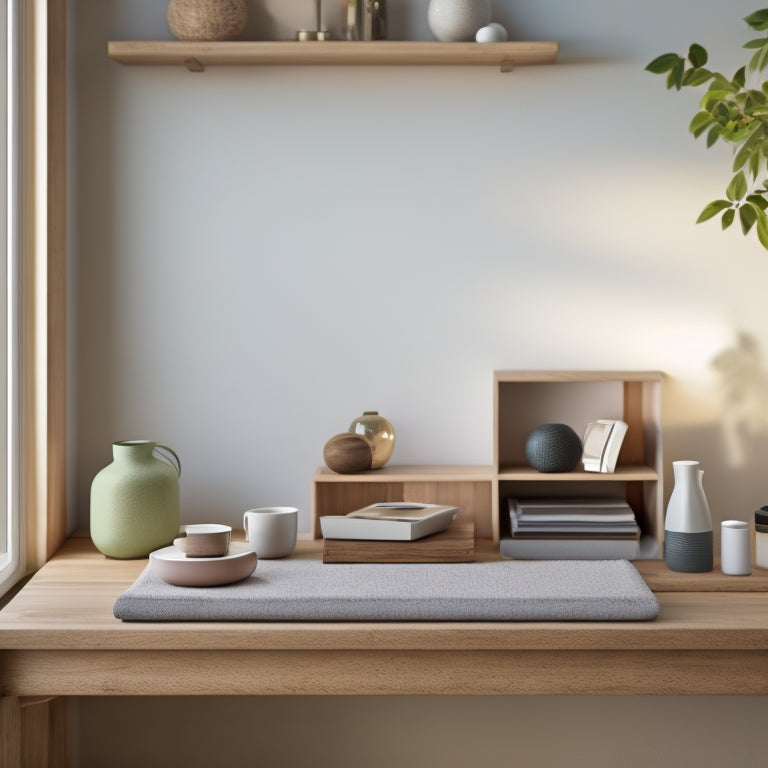
Ultimate Guide to Declutter and Organize
Share
Effective decluttering and organizing require a thorough approach. Start by establishing clear goals, developing a decluttering mindset, and implementing effective sorting techniques. Strategically organize spaces by maximizing storage, designating zones, and implementing policies like 'one in, one out.' To maintain a clutter-free lifestyle, commit to ongoing habits and practices, view clutter as a hindrance, and dedicate time daily to tidying up. By understanding the core principles and strategies, you'll be well on your way to achieving a peaceful and productive environment. Now, learn how to tailor these principles to your unique needs and spaces.
Key Takeaways
• Establish clear goals and motivations to drive your decluttering and organizing efforts towards a clutter-free space that aligns with your values.
• Implement strategies for organizing spaces, such as maximizing storage, designating zones, and utilizing vertical space to create a functional and peaceful environment.
• Develop a decluttering mindset by recognizing the significance of letting go of unnecessary items and focusing on what adds value to your life.
• Commit to ongoing habits and practices, such as daily tidying and regular decluttering sessions, to maintain a clutter-free lifestyle and promote productivity and well-being.
• Utilize effective sorting techniques, including categorizing items into keep, donate, and discard piles, to make intentional decisions about what stays and what goes.
Preparing for Decluttering Success
Before starting on a decluttering journey, it is important to establish a clear understanding of your goals and motivations, as this key step sets the tone for a successful and sustainable organizational transformation.
Developing a decluttering mindset is essential, where you recognize the significance of letting go of unnecessary items and focus on creating a clutter-free space that aligns with your values and priorities.
To achieve this, it's crucial to identify your motivations, whether it's to free up space, reduce stress, or improve productivity. By understanding your 'why,' you'll be more committed to the process and better equipped to implement effective sorting techniques, such as categorizing items into keep, donate, and discard piles, and making intentional decisions about what stays and what goes.
Strategies for Organizing Spaces
Effective organization of physical spaces hinges on the implementation of strategic systems and habits that facilitate ease of use, maintenance, and sustainability. By applying simple yet impactful strategies, individuals can transform their living and working environments into efficient and peaceful spaces.
| Space | Organizing Strategy | Benefits |
|---|---|---|
| Closet | Utilize double rods and shelves for maximizing storage | Increased storage capacity, reduced clutter |
| Desk | Implement a "touch once" policy for paperwork | Reduced paper clutter, increased productivity |
| Kitchen | Designate zones for cooking, prep, and storage | Streamlined workflow, reduced mess |
| Living Room | Establish a "one in, one out" rule for new items | Maintained balance, reduced clutter |
| Bathroom | Install a pegboard for hanging accessories | Increased storage, reduced countertops clutter |
Maintaining a Clutter-Free Lifestyle
To maintain a clutter-free lifestyle, one must commit to ongoing habits and practices that promote consistent decluttering and organizing efforts. This ensures a sense of order and serenity is sustained over time. A mindset shift is essential, where clutter is viewed as a hindrance to productivity and well-being, rather than a mere inconvenience.
Daily habits, such as dedicating 10-15 minutes to tidying up, can make a significant impact. Implementing a 'one in, one out' policy and scheduling regular decluttering sessions can also help maintain a clutter-free environment.
Frequently Asked Questions
How Do I Deal With Sentimental Items I Don't Want to Part With?
When facing sentimental items you're reluctant to part with, acknowledge the emotional attachment and consider creative display options or storage solutions that honor their sentimental value, allowing you to cherish memories while maintaining control over clutter.
Can I Declutter and Organize With Limited Time and Energy?
When facing limited time and energy, prioritize quick decluttering tips, such as focusing on one area at a time and setting a 10-minute timer, and energy-saving organization strategies, like using multi-functional storage solutions and batch-processing tasks.
What if My Family Members Resist Changes to Our Living Space?
When introducing changes to your living space, anticipate resistance from family members. For instance, Sarah's husband resisted her minimalistic approach, feeling it would deprive their children of sentimental items. Compromise and open communication can help: involve family members in decision-making, acknowledge their concerns, and find mutually beneficial solutions.
How Do I Organize Items That Don't Have a Designated Home?
When faced with items lacking a designated home, implement temporary solutions like creative storage bins or baskets. Then, employ sorting strategies to categorize items, considering donation options for unnecessary items, and ultimately, assign a permanent home for each item.
Will Decluttering and Organizing Really Make a Difference in My Life?
Embracing decluttering and organizing can have a profound impact on your life, fostering an improved mindset and increased productivity by creating a sense of control and clarity, allowing you to focus on what truly matters.
Related Posts
-

10 Best Online Low-Carb Meal Planning Courses
You're looking for a structured approach to low-carb meal planning, and online courses can provide the guidance and s...
